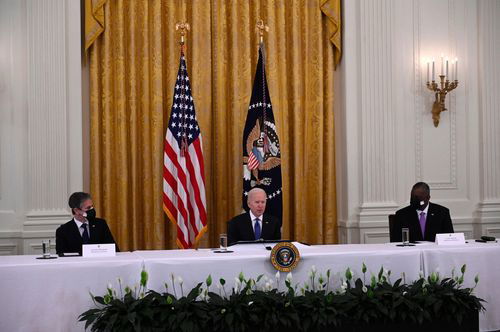Top Biden national security officials brief Congress on Afghanistan withdrawal

Top officials from the Biden administration’s national security team on Tuesday briefed lawmakers about the decision to withdraw troops from Afghanistan, facing questions from skeptical Republicans and Democrats alike about whether they’re prepared for the ramifications of what happens once US troops are gone.
Secretary of State Tony Blinken, Secretary of Defense Lloyd Austin, Director of National Intelligence Avril Haines and Chairman of the Joint Chiefs of Staff Mark Milley discussed the situation with members of both the House and Senate.
President Joe Biden announced last week that the United States would withdraw all remaining troops from the country by September 11.
It was clear from lawmakers afterward that no minds were changed by the briefing, with critics of the withdrawal saying they were unconvinced by the administration officials’ arguments and supporters saying they made an effective presentation. The briefings occurred ahead of a more public-facing debate, as the Senate Foreign Relations Committee plans to hold a public hearing on the withdrawal.
Both Republicans and more hawkish Democrats have raised concerns that the US withdrawal will lead to the Taliban retaking control of the country.
“There are no good options in Afghanistan,” Sen. Lindsey Graham, a South Carolina Republican, said after the briefing. “The moment the Taliban flag flies over a part of Afghanistan, it will send a shot of steroids to every jihadist in the world, that the Taliban beat the West; they beat us.”
Sen. Marco Rubio of Florida, the top Republican on the Senate Intelligence Committee, acknowledged that former President Donald Trump’s efforts to withdraw US troops played a role in Biden’s decision.
“At this point, the President didn’t have very many options, frankly. It was either to ramp up a new war, you’d have to get to 15,000 or 10,000 troops, or zero, given the decision that was made by the previous administration,” Rubio said, adding, “Once we leave, the probability of the Taliban taking over the country or substantial portions of it is very high.”
Key Democrats defended the decision to withdraw and the justification offered, saying that the rationale from the administration was sound and that a continued US presence simply wasn’t going to change the conditions on the ground.
“Secretary Blinken, in particular, all of them did a really good job of explaining the thought process that went into the decision, how carefully they made it, and how they did it in consultation with our allies, and how they felt it was not an easy decision, but it was the right decision,” said House Armed Services Chairman Adam Smith of Washington. “They also gave us some pretty good guideposts for how they’re going to go about implementing it, and the contingencies to manage the risk of the decision.”
Biden announced last Wednesday that the US would end its military mission in Afghanistan after nearly 20 years, noting that the reasons for keeping a military footprint in the country have become “increasingly unclear” over the past decade. Following the President’s announcement, NATO said it would also bring its military mission in Afghanistan to an end.
On Tuesday, the top US general for the Middle East told the House Armed Services Committee that he would report to Austin “by the end of the month” with options for maintaining the ability to conduct counterterrorism operations in Afghanistan after the withdrawal of US forces.
“We’re examining this problem with all of our resources right now to find a way to do it, in the most intelligent, risk-free manner that we can,” CENTCOM Commander Gen. Kenneth McKenzie said.
McKenzie said he didn’t want to “put on rose-colored glasses and say it’s going to be easy to do,” but that “the US military can do just about anything.”
Biden’s decision to withdraw the remaining troops from Afghanistan has been met with a mixed reaction from members of Congress. Some lawmakers from both sides of the aisle have expressed disappointment at the move — which was announced before the Taliban and Afghan government have reached any sort of political settlement — fearing it could imperil gains by women and civil society in Afghanistan.
Rep. Michael Waltz, a Florida Republican critical of the withdrawal plans, pointed to McKenzie’s testimony Tuesday to argue the military is not prepared.
“We just had public testimony just before this with the head of Central Command — there really is no plan,” Waltz said. “The Pentagon is scrambling to come up with a plan as we speak.”
On Monday, US Special Representative for Afghanistan Reconciliation Zalmay Khalilzad, who spearheaded diplomatic efforts under both the Trump and Biden administrations, acting Assistant Secretary of Defense for Indo-Pacific Security Affairs David Helvey, and members of the intelligence community briefed the Senate Foreign Relations Committee on the decision.
Democratic Sen. Bob Menendez, the chairman of the committee, told reporters following the classified briefing that he got some clarity on the decision but still had questions about the decision to withdraw troops from Afghanistan and the “contingency planning” for various scenarios once the US leaves.
“President Biden got dealt a very difficult hand. There are no good solutions to the challenge of Afghanistan. But there are serious questions,” Menendez told reporters. “After 20 years of blood and national treasure, the question is still in my mind, how do we ultimately ensure the Taliban cannot run over the Afghan government and potentially create it as a place for terrorist attacks to take place? How do we preserve the rights of Afghan women in civil society that have been achieved?”
He said he was planning hold a public hearing on the withdrawal decision.
Khalilzad, Acting Under Secretary of Defense for Policy Amanda Dory, Vice Admiral Lisa Franchetti, and Deputy Director of National Intelligence for Mission Integration Morgan Muir will also be on the Hill on Tuesday, according to a congressional source.
This story has been updated with details from the briefing.